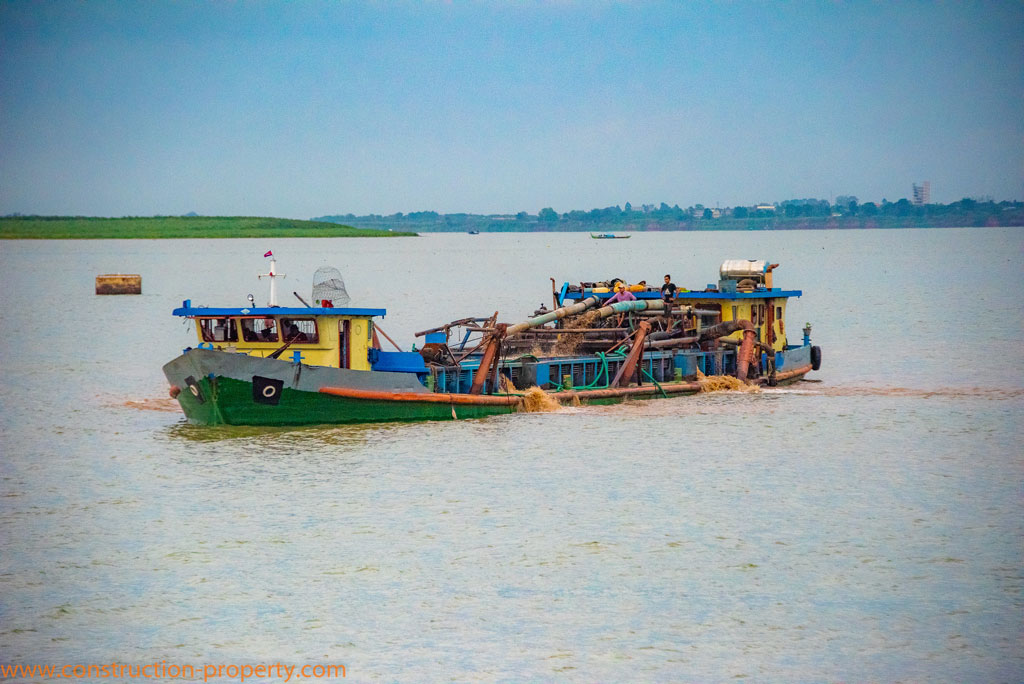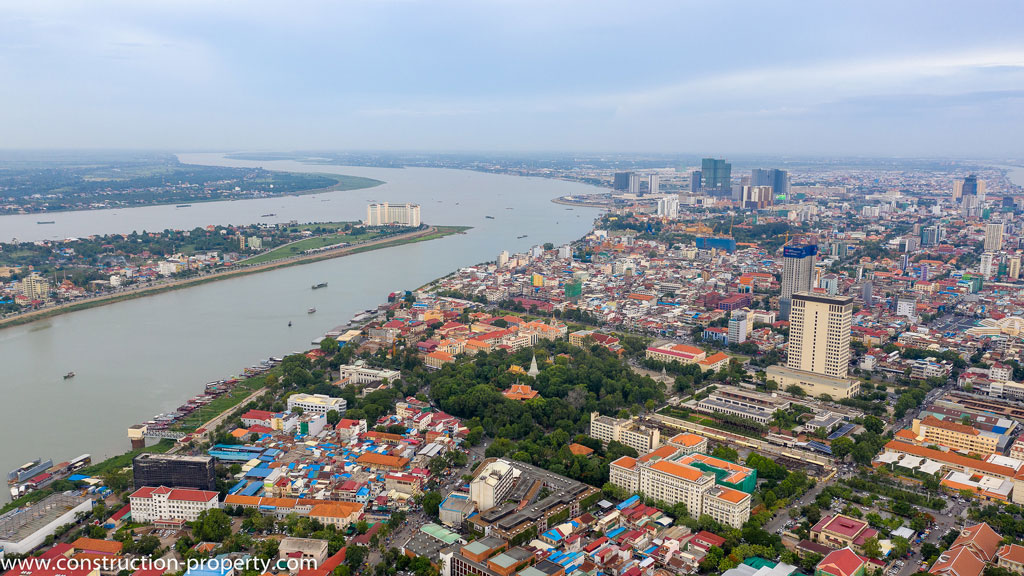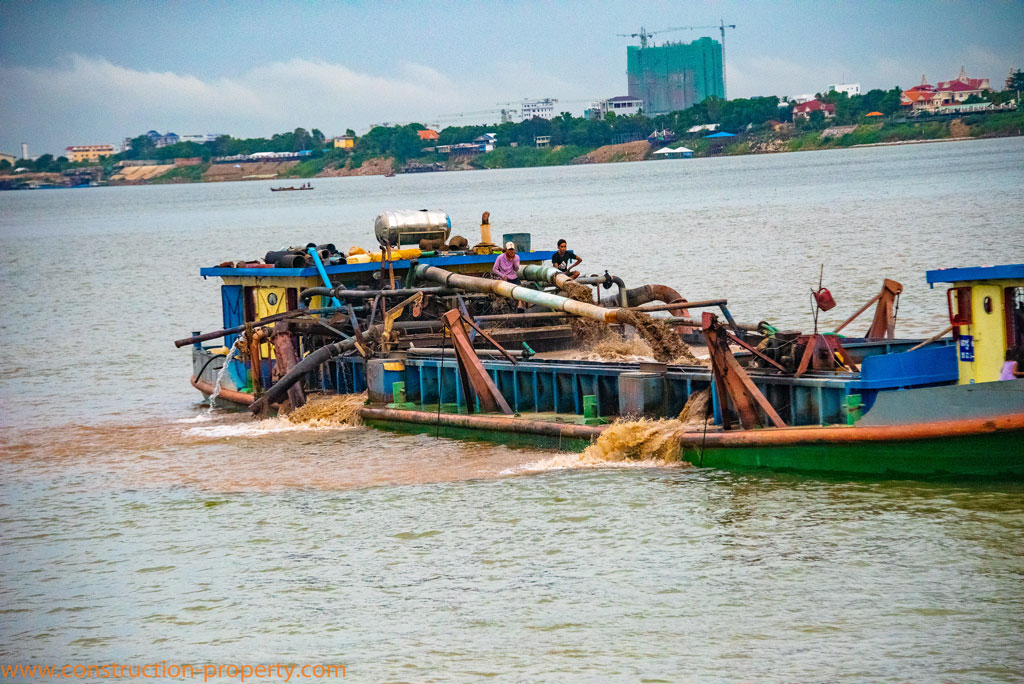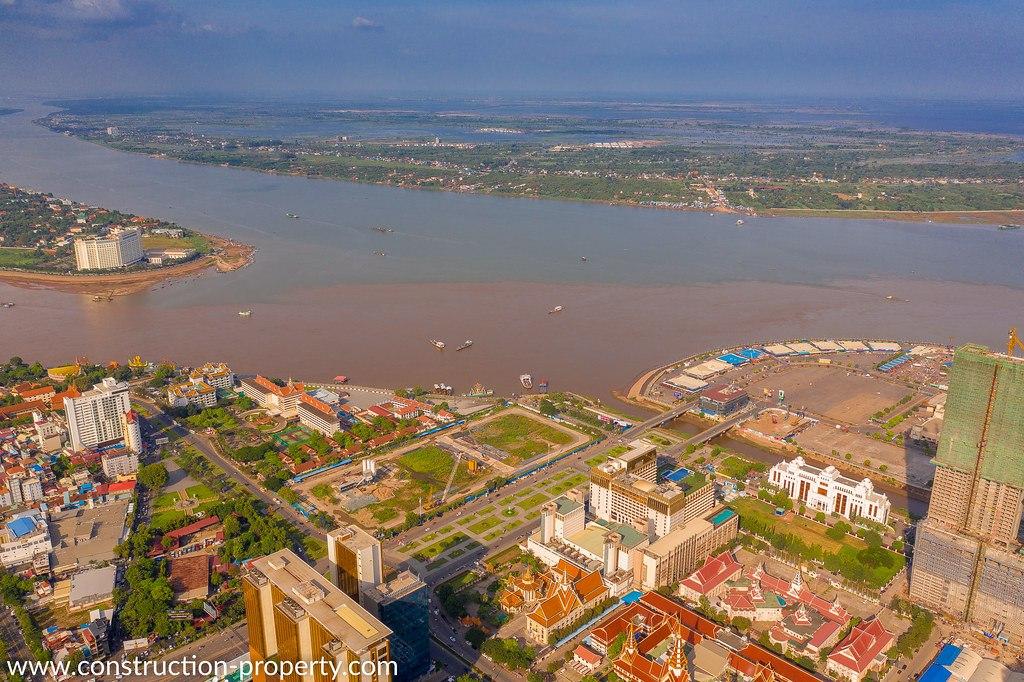រដ្ឋបង្ហើបពីផែនការបង្កើតមជ្ឈមណ្ឌលភស្ដុភារកម្មដ៏ទំនើបមួយ នៅខេត្តព្រះសីហនុ
រដ្ឋាភិបាលកម្ពុជាបង្ហើបពីការបង្កើតនូវមជ្ឈមណ្ឌលភស្តុភារកម្មដ៏ទំនើបមួយ ដែលជាគម្រោងមួយស្ថិតក្នុងគម្រោងអភិវឌ្ឍន៍មជ្ឈមណ្ឌលភស្តុភារកម្មខេត្តព្រះសីហនុ។ គំនិតផ្តួចផ្តើមនេះមានគោលបំណងធ្វើសមាហរណកម្មសេវាភស្ដុភារកម្មសម្រាប់ការលើកដាក់ទំនិញ និងទូកុងតឺន័រ ទាំងក្នុងស្រុក និងអន្ដរជាតិ។ នេះបើតាមជំនួបរវាងឯកឧត្តម ស៊ុន ចាន់ថុល ឧបនាយករដ្ឋមន្ត្រី អនុប្រធានទី១ ក្រុមប្រឹក្សាអភិវឌ្ឍន៍កម្ពុជា និងប្រតិភូសាជីវកម្មហិរញ្ញវត្ថុអន្តរជាតិ (International Finance Corporation – IFC) នៃធនាគារពិភពលោក អំពីវឌ្ឍនភាពនៃការសិក្សាគម្រោងអភិវឌ្ឍន៍មជ្ឈមណ្ឌលភស្តុភារកម្មខេត្តព្រះសីហនុ កាលពីថ្ងៃទី២៦ ខែមីនា ឆ្នាំ២០២៥។ បន្ថែមពីនេះ គម្រោងមជ្ឈមណ្ឌលភស្តុភារកម្មនេះ គ្រោងនឹងតភ្ជាប់ទៅតំបន់សេដ្ឋកិច្ចពិសេសនៃកំពង់ផែព្រះសីហនុ (SPSEZ) ដែលនឹងចូលរួមបង្កើនសមត្ថភាពផ្ទុកទំនិញរបស់កំពង់ផែ ក៏ដូចជាជំរុញទៅដល់ការរីកលូតលាស់នៃវិស័យភស្ដុភារកម្មនៅប្រទេសកម្ពុជាផងដែរ។ ក្រៅពីការផ្ដល់នូវសេវាភស្ដុភារកម្មបែបប្រពៃណីដូចជាការដឹកជញ្ជូន, ការផ្ទុកទំនិញ, ការប្រមូលផ្តុំទំនិញ និងការចែកចាយទំនិញ, មជ្ឈមណ្ឌលភស្តុភារកម្មទំនើបនេះ ក៏នឹងផ្ដល់នូវសេវាកម្មបន្ថែមផ្សេងទៀតដូចជា ប្រព័ន្ធគ្រប់គ្រងទំនិញ និងការបំពេញបែបបទពន្ធគយសម្រាប់ទំនិញចេញចូល និងសម្រួលទៅដល់អ្នកផ្ដល់សេវាកម្មផ្សេងៗទៀត ដូចជា ឃ្លាំងផ្ទុកទំនិញជាប់ពន្ធ (Bonded Warehousing) ជាដើម។ គម្រោងនេះ ក៏នឹងនាំមកនូវសេវាភស្ដុភារកម្មបែបថ្មី ដូចជា ខ្សែច្រវ៉ាក់ទំនិញត្រជាក់ (Cold Chain), ការផ្ទុកទំនិញរាយដែលតិចជាងកុងតឺន័រ (Less than container load), និងប្រព័ន្ធគ្រប់គ្រងអ្នកផ្គត់ផ្គង់ទំនិញ […]
ក្រុមហ៊ុនចិនប្រកាសចង់បើករោងចក្រកាត់ដេរនៅក្នុងតំបន់សេដ្ឋកិច្ចពិសេស ៣កន្លែង នៅកម្ពុជា
នៅក្នុងការផ្លាស់ប្តូរដ៏សំខាន់មួយសម្រាប់ឧស្សាហកម្មកាត់ដេរនៅកម្ពុជា ក្រុមហ៊ុនចិន Nanchang Shunmin បានប្រកាសពីចេតនារបស់ខ្លួនក្នុងការបង្កើតរោងចក្រកាត់ដេរនៅក្នុងតំបន់សេដ្ឋកិច្ចពិសេសចំនួនបីនៅទូទាំងប្រទេស។ ការប្រកាសនេះធ្វើឡើងក្នុងជំនួបនាពេលថ្មីៗនេះរវាងលោក គង់ ពុទ្ធា អនុព័ន្ធពាណិជ្ជកម្មកម្ពុជានៅទីក្រុងប៉េកាំង និងតំណាងមកពី Nanchang Shunmin ខណៈដែលពួកគេបានពិភាក្សាអំពីសក្តានុពលនៃការវិនិយោគ និងការបណ្តាក់ទុនអាជីវកម្មនៅកម្ពុជា។ ក្រុមហ៊ុនមានចំណាប់អារម្មណ៍ជាពិសេសក្នុងការបង្កើតរោងចក្រនៅតាមទីតាំងសំខាន់ៗមួយចំនួន រួមមានតំបន់សេដ្ឋកិច្ចពិសេសភ្នំពេញ តំបន់សេដ្ឋកិច្ចពិសេសខេត្តព្រះសីហនុ និងតំបន់សេដ្ឋកិច្ចពិសេសមហាថានក្នុងខេត្តស្វាយរៀង។ ការអភិវឌ្ឍន៍នេះស្របតាមនិន្នាការដែលកំពុងបន្តនៅក្នុងប្រទេសកម្ពុជា ដែលការវិនិយោគរបស់ចិនបានជាប់ចំណាត់ថ្នាក់ជាប្រភពមួយក្នុងចំណោមប្រភពដើមទុនបរទេសកំពូលអស់រយៈពេលជាងមួយទសវត្សរ៍មកហើយ។ យោងតាមក្រុមប្រឹក្សាអភិវឌ្ឍន៍កម្ពុជា (CDC) ក្នុងរយៈពេលពីរខែដំបូងនៃឆ្នាំ២០២៥ CDC បានអនុម័តគម្រោងវិនិយោគចំនួន ១១២ ដែលមានទំហំទឹកប្រាក់ជាង ១ពាន់លានដុល្លារ។ គួរកត់សម្គាល់ថា ការវិនិយោគពីប្រទេសចិនមានជិត ៨០% នៃចំនួនសរុបនេះ។ ដោយសារសេដ្ឋកិច្ចកម្ពុជាបន្តទាក់ទាញការវិនិយោគពីបរទេស សក្តានុពលនៃការបង្កើតរោងចក្រកាត់ដេរទាំងនេះអាចជំរុញទីផ្សារការងារក្នុងស្រុកបន្ថែមទៀត និងលើកកំពស់សមត្ថភាពផលិតកម្មរបស់ប្រទេស។ - Video Advertisement -
រដ្ឋាភិបាលកម្ពុជា គ្រោងវិនិយោគជិត $១ពាន់លាន អភិវឌ្ឍខេត្តព្រះសីហនុទៅជាមជ្ឈមណ្ឌលភ័ស្ដុភារប្រចាំតំបន់
នៅក្នុងការផ្លាស់ប្តូរដ៏សំខាន់មួយ ដើម្បីបង្កើនហេដ្ឋារចនាសម្ព័ន្ធសេដ្ឋកិច្ចរបស់ខ្លួន រដ្ឋាភិបាលកម្ពុជាបានប្រកាសពីគម្រោងវិនិយោគជិត ១ពាន់លានដុល្លារអាមេរិក ក្នុងការអភិវឌ្ឍន៍ក្រុងព្រះសីហនុ ទៅជាមជ្ឈមណ្ឌលដឹកជញ្ជូនក្នុងតំបន់នៅឆ្នាំ ២០២៩។ ការវិនិយោគនេះនឹងត្រូវបានអនុវត្តជាបីដំណាក់កាលសំខាន់ៗ ដោយដំណាក់កាលទី១ នៃការអភិវឌ្ឍន៍កំពង់ផែក្រុងព្រះសីហនុបានបើកដំណើរការរួចហើយកាលពីឆ្នាំមុន ដោយប្រើប្រាស់ថវិកាកម្ចីពីប្រទេសជប៉ុនប្រមាណ ២០០លានដុល្លារអាមេរិក។ មូលនិធិដែលនៅសេសសល់ ត្រូវបានប៉ាន់ស្មានថាមានចំនួន ប្រមាណ ៦០០លានដុល្លារអាមេរិក សម្រាប់គាំទ្រដល់ដំណាក់កាលពីរបន្ទាប់ទៀត។ សម្តេចនាយករដ្ឋមន្ត្រី បានសង្កត់ធ្ងន់ថា ការវិនិយោគដ៏ច្រើនសន្ធឹកនេះ មានគោលបំណងមិនត្រឹមតែប្រែក្លាយខេត្តព្រះសីហនុ ទៅជាកំពង់ផែអន្តរជាតិប៉ុណ្ណោះទេ ប៉ុន្តែថែមទាំងប្រែក្លាយវាទៅជាមជ្ឈមណ្ឌលដឹកជញ្ជូនដ៏សំខាន់បំផុតក្នុងតំបន់ផងដែរ។ ទន្ទឹមគ្នានេះដែរ សម្តេចក៏លើកឡើងពីសក្ដានុពលនៃការរីកចម្រើនបន្ថែមទៀតនៅក្នុងខេត្តព្រះសីហនុ ដែលជាចំណុចផ្តោតនៃ “កម្មវិធីពិសេសរបស់រដ្ឋាភិបាលក្នុងការជំរុញការវិនិយោគនៅក្នុងខេត្តព្រះសីហនុឆ្នាំ២០២៤” ។ កម្មវិធីនេះត្រូវបានកំណត់ថានឹងបន្តផ្តល់អត្ថប្រយោជន៍ពិសេសរហូតដល់ចុងឆ្នាំ២០២៥។ គិតមកដល់ពេលនេះ ខេត្តព្រះសីហនុ តាមរយៈការប្រកាសដាក់ចេញនូវ «កម្មវិធីពិសេសជំរុញការវិនិយោគក្នុងខេត្តព្រះសីហនុឆ្នាំ២០២៤» របស់រដ្ឋាភិបាល បានសម្រេចបន្តផ្តល់ «អត្ថប្រយោជន៍ពិសេស» ក្រោមវិសាលភាពនៃកម្មវិធីពិសេសនេះរហូតដល់ដំណាច់ឆ្នាំ២០២៥ ជាលទ្ធផលក្រុមការងារពិសេសបានជំរុញការវិនិយោគទទួលបានសំណើសុំលើកទឹកចិត្តចំនួន ៣០២ គម្រោង ក្នុងនោះគម្រោងដែលទទួលបាន «លិខិតអនុញ្ញាតជាគោលការណ៍» ចំនួន ២៦៩ គម្រោង។ ជាងនេះទៀត ដើម្បីជំរុញសកម្មភាពអភិវឌ្ឍន៍ឡើងវិញ រាជរដ្ឋាភិបាល ក៏ទើបបានអនុម័តគម្រោងអភិវឌ្ឍន៍ខេត្តជាប់សមុទ្រ ក្នុងនោះយកខេត្តព្រះសីហនុជាគោលផងដែរ។នេះបើតាមការបញ្ជាក់បន្ថែមពីសម្តេចធិបតី។ យុទ្ធសាស្ត្រអភិវឌ្ឍន៍ដ៏ទូលំទូលាយនេះ គូសបញ្ជាក់ពីការប្តេជ្ញាចិត្តរបស់រដ្ឋាភិបាលកម្ពុជា ក្នុងការជំរុញកំណើនសេដ្ឋកិច្ច និងការលើកកម្ពស់ការតភ្ជាប់ក្នុងតំបន់ តាមរយៈការវិនិយោគជាយុទ្ធសាស្ត្រលើហេដ្ឋារចនាសម្ព័ន្ធ។ […]
ចិនសន្យាថា នឹងពិចារណាបង្កើតតំបន់កសិ-ឧស្សាហកម្មផលិតវត្ថុធាតុដើមនៅកម្ពុជា
នៅក្នុងការអភិវឌ្ឍន៍ដ៏សំខាន់មួយសម្រាប់ទិដ្ឋភាពឧស្សាហកម្មរបស់កម្ពុជា ក្រសួងការបរទេសនៃខេត្ត Jiangsu នៃសាធារណៈរដ្ឋប្រជាមានិតចិនបានបង្ហាញពីឆន្ទៈរបស់ខ្លួនក្នុងការស្វែងយល់ពីការបង្កើតតំបន់កសិឧស្សាហកម្មដែលមានគោលបំណងផលិតវត្ថុធាតុដើម។ គំនិតផ្តួចផ្តើមនេះធ្វើឡើងតាមសំណើរបស់កម្ពុជា ដើម្បីជួយសម្រួលដល់ការផលិតផលិតផលពាក់កណ្តាលសម្រេចសម្រាប់ទាំងឧស្សាហកម្មក្នុងស្រុក និងទីផ្សារនាំចេញ។ សំណើនេះត្រូវបានពិភាក្សាក្នុងកិច្ចប្រជុំការងារដែលធ្វើឡើងនៅថ្ងៃទី២៤ ខែមីនា ឆ្នាំ២០២៥ រវាងលោក ជា វុទ្ធី អគ្គលេខាធិការនៃគណៈកម្មាធិការវិនិយោគកម្ពុជា និងគណៈប្រតិភូដឹកនាំដោយលោក Jin Sangjin អនុរដ្ឋមន្ត្រីក្រសួងការបរទេសនៃខេត្ត Jiangsu។ ក្នុងជំនួបនោះ ឯកឧត្តម ជា វុទ្ធី បានថ្លែងអំណរគុណចំពោះអាជ្ញាធរខេត្ត Jiangsu ចំពោះការលើកទឹកចិត្តជាបន្តបន្ទាប់សម្រាប់ការវិនិយោគនៅកម្ពុជា។ លោកបានលើកឡើងពីអត្ថប្រយោជន៍សក្តានុពលនៃការបង្កើតតំបន់កសិឧស្សាហកម្មដែលផ្តោតលើការផលិតវត្ថុធាតុដើម និងពាក់កណ្តាលសម្រេច ជាពិសេសសម្រាប់ឧស្សាហកម្មគ្រឿងសង្ហារឹម និងសំបកកង់។ ឯកឧត្តម បានកត់សម្គាល់ថា ខណៈដែលប្រទេសកម្ពុជាសម្បូរទៅដោយធនធានធម្មជាតិ មានតម្រូវការជាខ្លាំងសម្រាប់ការលើកកម្ពស់បច្ចេកវិទ្យាផលិត និងកែច្នៃ។ លោក Jin Sangjin បានឆ្លើយតបជាវិជ្ជមានចំពោះសំណើនេះ ដោយយល់ស្របថា ការបង្កើតតំបន់កសិឧស្សាហកម្មអាចផ្តល់អត្ថប្រយោជន៍យ៉ាងសំខាន់ដល់ប្រទេសកម្ពុជា តាមរយៈការកាត់បន្ថយការពឹងផ្អែកលើវត្ថុធាតុដើមដែលបាននាំចូល និងជំរុញការបង្កើតតម្លៃបន្ថែមក្នុងស្រុកសម្រាប់ឧស្សាហកម្មធំៗ។ ជាក់ស្តែង ក្នុងរយៈពេល២ខែដើមឆ្នាំ២០២៥ ក្រុមប្រឹក្សាអភិវឌ្ឍន៍កម្ពុជាបានអនុម័តគម្រោងវិនិយោគចំនួន ១១២ ក្នុងទុនវិនិយោគប្រមាណជាង ១ពាន់លានដុល្លារ ហើយការវិនិយោគមកពីប្រទេសចិនបានរួមចំណែកដល់ទៅប្រមាណជិត ៨០% នៃទុនវិនិយោគសរុប។ (អានបន្ថែម) ជាពិសេស ថ្មីៗនេះ […]
កម្ពុជាទទួលបានគម្រោងវិនិយោគថ្មី ១២គម្រោង មានទុនជាង១០៤លានដុល្លារ
នៅក្នុងការអភិវឌ្ឍន៍ដ៏គួរឱ្យរំភើបសម្រាប់សេដ្ឋកិច្ចកម្ពុជា ក្រុមប្រឹក្សាអភិវឌ្ឍន៍កម្ពុជាកំពុងពិនិត្យ និងពិភាក្សលើសំណើសុំចុះបញ្ជីគម្រោងវិនិយោគថ្មីមានលក្ខណៈ សម្បត្តិគ្រប់គ្រាន់ចំនួន ១២គម្រោង រួមជាមួយនឹងគម្រោងបន្ថែមមុខសញ្ញាផលិតកម្មចំនួន ១គម្រោង ដែលមានទុនវិនិយោគសរុបប្រមាណ ១០៤លានដុល្លារ។ កិច្ចប្រជុំដ៏សំខាន់នេះ ធ្វើឡើងនៅថ្ងៃទី២៥ ខែមីនា ឆ្នាំ២០២៥ ក្រោមការដឹកនាំរបស់ ឯកឧត្តម ជា វុទ្ធី អគ្គលេខាធិការនៃគណៈកម្មាធិការវិនិយោគកម្ពុជា។ គម្រោងថ្មីទាំងនេះ គ្រោងនឹងបង្កើតការងារប្រមាណ ៤.៤០០ នៅទូទាំងវិស័យឧស្សាហកម្មចម្រុះ ដែលនេះជាការបង្ហាញពីសក្តានុពលដ៏សម្បូរបែបរបស់កម្ពុជា។ គោលដៅនៃការវិនិយោគទាំងនេះមានចាប់ពីការកែច្នៃឈើដែលដាំដុះក្នុងស្រុករហូតដល់ការផលិតឧបករណ៍បំភ្លឺអគ្គិសនី និងឧបករណ៍ប្រើប្រាស់ក្នុងផ្ទះ។ ការបណ្តាក់ទុនបន្ថែមរួមមានការផលិតចង្កៀងតុបតែង អំពូលភ្លើង ឧបករណ៍អេឡិចត្រូនិក និងគ្រឿងបន្លាស់ ឧបករណ៍ប្រើប្រាស់ក្នុងផ្ទះដែក និងផលិតផលក្រដាស។ ជាការកត់សម្គាល់ ទេសភាពនៃការវិនិយោគត្រូវបានពង្រឹងបន្ថែមជាមួយនឹងផែនការសម្រាប់សេវាកម្មបោកអ៊ុត គម្រោងហេដ្ឋារចនាសម្ព័ន្ធដែលមានគោលបំណងបង្កើតមន្ទីរពេទ្យទំនើប និងពហុព្យាបាលដែលមានគ្រែចំនួន ៨០ និងគម្រោងទេសចរណ៍ដែលមានរមណីយដ្ឋានចម្រុះ។ គួរបញ្ជាក់ថា គម្រោងទាំងអស់ខាងលើ គ្រោងនឹងបោះទីតាំងនៅទូទាំងខេត្តសំខាន់ៗមួយចំនួន រួមមានរាជធានីភ្នំពេញ តាកែវ កំពង់ស្ពឺ ត្បូងឃ្មុំ ព្រះសីហនុ និងស្ទឹងត្រែង ដែលនេះជាការបង្ហាញពីការប្តេជ្ញាចិត្តក្នុងការលើកកម្ពស់ឱកាសសេដ្ឋកិច្ចនៅទូទាំងប្រទេសកម្ពុជា។ ដោយសារប្រទេសកម្ពុជាបន្តទាក់ទាញការវិនិយោគពីបរទេសយ៉ាងច្រើន លំហូរការងារ និងសេវាកម្មដែលរំពឹងទុកនឹងពង្រឹងមូលដ្ឋានគ្រឹះសេដ្ឋកិច្ចរបស់ខ្លួន និងលើកកម្ពស់គុណភាពជីវិតរបស់ប្រជាពលរដ្ឋក្នុងស្រុក។ - Video Advertisement -
ក្រុមហ៊ុនជប៉ុន Panasonic ចង់មកបើករោងចក្រនៅកម្ពុជា ខណៈកំពុងដំណើរការរោងចក្រចំនួន១៩ នៅថៃ និងវៀតណាម
ក្រុមហ៊ុន Panasonic Cambodia បានប្រកាសពីចេតនារបស់ខ្លួនក្នុងការបង្កើតរោងចក្រនៅក្នុងប្រទេសកម្ពុជា ដែលជាផ្នែកមួយនៃការពង្រីកខ្លួននៅក្នុងតំបន់អាស៊ីអាគ្នេយ៍។ បច្ចុប្បន្ននេះ ក្រុមហ៊ុនផលិតគ្រឿងអេឡិចត្រូនិកដ៏ល្បីរបស់ជប៉ុនមួយនេះកំពុងដំណើរការរោងចក្រចំនួន១៩ នៅទូទាំងប្រទេសថៃ និងវៀតណាម ដោយក្នុងនោះ រោងចក្រចំនួន១៥ មានទីតាំងនៅក្នុងប្រទេសថៃ និង ៤ទៀតនៅក្នុងប្រទេសវៀតណាម។ ការប្រកាសនេះបានធ្វើឡើងក្នុងកិច្ចប្រជុំប្រកបដោយផលិតភាពកាលពីថ្ងៃទី២១ ខែមីនា ឆ្នាំ២០២៥ រវាងឯកឧត្តម ហែម វណ្ឌី រដ្ឋមន្ត្រីក្រសួងឧស្សាហកម្ម វិទ្យាសាស្ត្រ បច្ចេកវិទ្យា និងនវានុវត្តន៍ និងគណៈប្រតិភូមកពីក្រុមហ៊ុន Panasonic Cambodia ។ នាឱកាសនោះ លោក Hisakazu Maeda នាយកប្រចាំប្រទេសនៃក្រុមហ៊ុន Panasonic Cambodia បានបង្ហើបថា ក្រុមហ៊ុនកំពុងដំណើរការចុះបញ្ជីផលិតផលរបស់ខ្លួនជាមួយវិទ្យាស្ថានស្តង់ដារកម្ពុជា (ISC) ដើម្បីត្រួសត្រាយផ្លូវសម្រាប់ការបង្កើតរោងចក្រថ្មី។ គួរកត់សម្គាល់ថា បច្ចុប្បន្នក្រុមហ៊ុន Panasonic កំពុងរួមចំណែកទីផ្សារកម្ពុជាប្រមាណ ៦០% សម្រាប់ផលិតផលភ្ជាប់នឹងជញ្ជាំង ដែលបង្ហាញពីឥទ្ធិពលដ៏សំខាន់របស់ខ្លួននៅក្នុងតំបន់។ ជាមួយគ្នានោះដែរ ឯកឧត្តមរដ្ឋមន្ត្រី ហែម វណ្ឌី បានឆ្លើយតបជាវិជ្ជមានចំពោះសំណើរបស់ក្រុមហ៊ុន Panasonic ដោយជំរុញឱ្យក្រុមហ៊ុនស្វែងរកតំបន់សេដ្ឋកិច្ចពិសេសសម្រាប់បោះទីតាំងរោងចក្រនាពេលអនាគត និងលើកទឹកចិត្តឱ្យក្រុមហ៊ុនចូលរួមលើគម្រោងស្រាវជ្រាវ និងនវានុវត្តន៍ […]



 English
English











